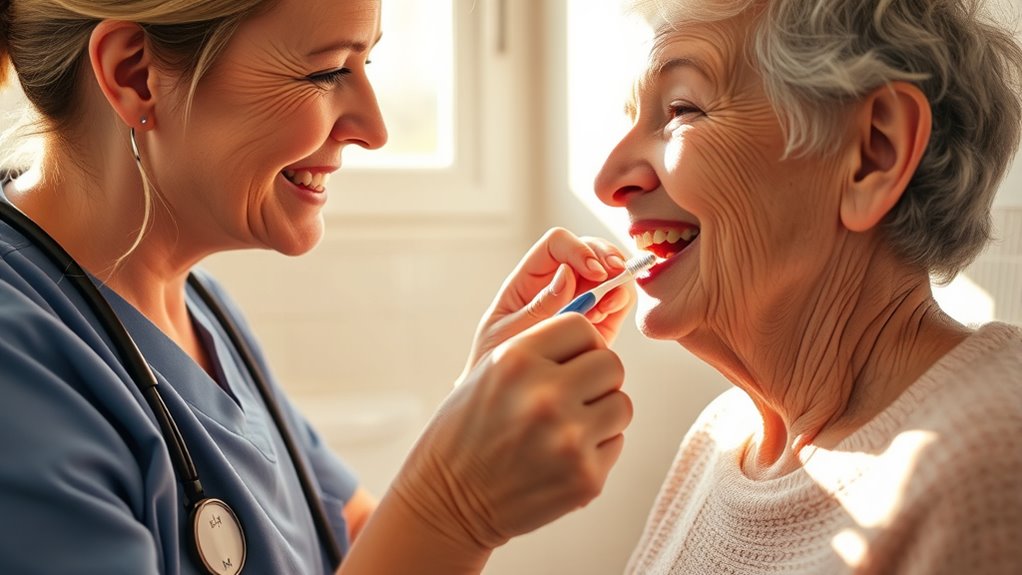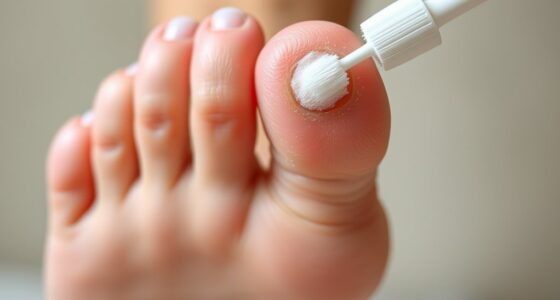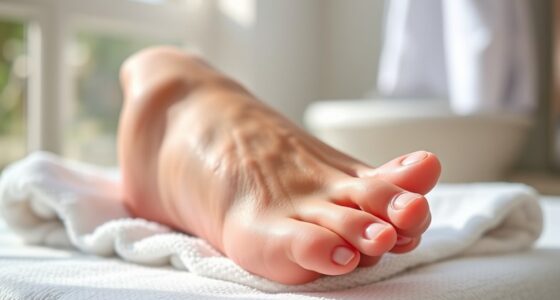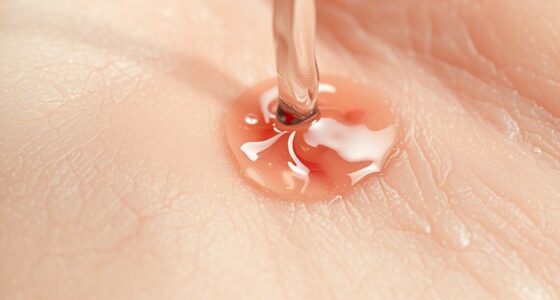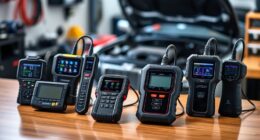Maintaining oral hygiene with limited mobility can be challenging, but it’s essential for your overall health. Using adapted tools like larger-handled brushes or electric toothbrushes makes cleaning easier and more effective. Proper caregiver training ensures gentle, consistent care that prevents plaque buildup and oral infections. Clear communication about your needs helps personalize your routine, boosting confidence and independence. If you want to discover more tips and techniques to improve your oral care, there’s plenty more to explore.
Key Takeaways
- Adapted toothbrushes, electric tools, and floss holders facilitate effective oral care for individuals with limited mobility.
- Proper caregiver training ensures gentle, correct techniques to prevent discomfort and maintain oral health.
- Customized routines and communication help address individual needs and improve cooperation during oral hygiene.
- Assistive devices promote independence, making daily oral care easier and more consistent.
- Regular monitoring and proper techniques reduce risks of plaque buildup, infections, and oral diseases.
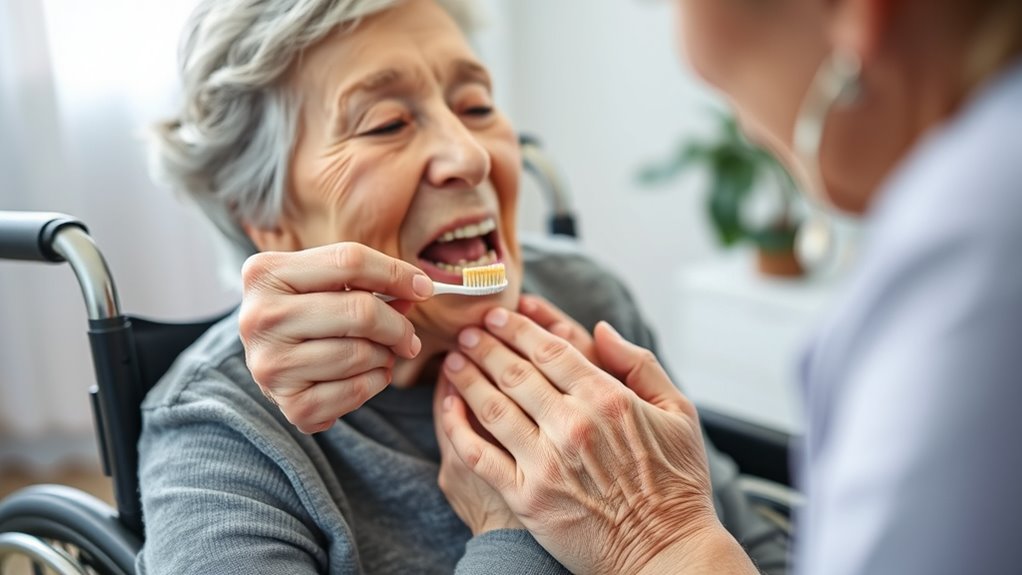
Maintaining good oral hygiene can be challenging for individuals with limited mobility, but it’s essential for overall health. When you have mobility issues, performing routine tasks like brushing and flossing can become difficult, especially if you lack strength, dexterity, or range of motion. Fortunately, assistive devices are designed to make these tasks easier and more manageable. These tools include adapted toothbrushes with larger handles, electric toothbrushes, and floss holders, which help you reach your mouth comfortably and clean thoroughly. Using the right assistive devices can considerably reduce the effort required, making daily oral care less frustrating and more effective.
Assistive devices simplify oral care for those with limited mobility, promoting better health and independence.
Additionally, understanding the importance of mindfulness and proper technique in your routine can help improve the quality of your oral hygiene efforts. However, simply having the right tools isn’t enough. Proper caregiver training plays a vital role in maintaining your oral health. Caregivers, whether family members or professionals, need to learn the correct techniques for assisting with brushing and flossing without causing discomfort or injury. Training covers how to position your head and body for the best access, how much pressure to apply, and how to ensure all areas of your mouth are properly cleaned. When caregivers are well-trained, they can provide consistent, gentle care that prevents plaque buildup, cavities, and gum disease.
If you’re living with limited mobility, it’s important to communicate your needs clearly to your caregiver. Demonstrate how you prefer your oral hygiene routine to be handled, and don’t hesitate to ask for specific assistive devices that suit your comfort and abilities. Regularly updating caregiver training ensures they stay informed about the latest techniques and tools, which can improve your overall oral health. Additionally, caregivers should be attentive to signs of oral discomfort, bleeding, or changes in your mouth that could indicate underlying issues.
Incorporating assistive devices into your routine can also boost your independence and confidence. Many devices are designed to be easy to handle, requiring minimal effort, which means you may be able to perform some tasks yourself with minimal assistance. This not only promotes a sense of autonomy but also ensures that your oral hygiene is maintained consistently. Remember, maintaining good oral health isn’t just about having a bright smile; it’s about preventing infections, pain, and other health complications that can arise from poor oral care. Being aware of emotional intelligence and communication strategies can further support caregiver-patient rapport and effective care.
Frequently Asked Questions
How Often Should Oral Hygiene Be Performed for Those With Limited Mobility?
You should perform oral hygiene at least twice daily for those with limited mobility, following the frequency guidelines recommended by healthcare professionals. Regular brushing and cleaning help prevent infections and dental issues. It’s vital to have caregiver training to guarantee proper techniques and consistency. By maintaining this routine, you support better oral health, reduce discomfort, and prevent more serious complications. Consistency and proper training are key for effective oral care in these individuals.
What Are the Best Tools for Easy Oral Care in Limited Mobility?
Imagine your mouth as a busy city that needs a gentle, effective cleaning crew. Electric toothbrushes are your superheroes, effortlessly reaching all areas with minimal effort. Adaptive flossers are like trusty sidekicks, helping you navigate tight spaces with ease. Together, these tools make oral care simpler and more efficient, ensuring your smile stays bright. With the right tools, you’re in control, turning a chore into a manageable part of your daily routine.
How Can Caregivers Assist With Daily Oral Hygiene Effectively?
You can assist with daily oral hygiene effectively by using assistive devices like adapted toothbrushes and rinsing aids. Make sure you’re trained through caregiver training programs to perform gentle, thorough care without causing discomfort. Maintain a consistent routine, encourage your loved one to rinse and spit, and be patient. Your attentive, skilled approach helps prevent dental issues and promotes their overall health and well-being.
Are There Specific Products Recommended for Sensitive Mouths?
If you think gentle oral care isn’t essential, think again—your loved one’s comfort depends on it! For sensitive mouths, use specifically designed sensitive mouth products that offer soothing relief. These gentle oral care products reduce irritation and make brushing a comfortable experience. Look for options labeled “sensitive” or “gentle,” and avoid harsh ingredients. With the right products, you guarantee safe, effective, and gentle oral care every day.
What Signs Indicate Oral Health Issues in Limited Mobility Patients?
You should look for signs detection like redness, swelling, or bleeding gums, which indicate oral health issues. Symptom recognition is key—notice if there’s persistent bad breath, pain when chewing, or loose teeth. Being attentive to these clues helps you identify potential problems early, so you can seek professional care promptly. Regularly check for these signs, and don’t ignore any changes to maintain good oral health in limited mobility patients.
Conclusion
Maintaining oral hygiene in those with limited mobility is like tending a delicate garden—you must nurture it daily with patience and care. Each brushstroke is a seed planted, symbolizing hope and health, while neglect lets the weeds of decay take root. By staying committed and attentive, you protect this fragile bloom, ensuring it continues to flourish. Your efforts become a beacon of resilience, reminding us that even the smallest acts can preserve beauty and dignity in life’s quiet moments.
